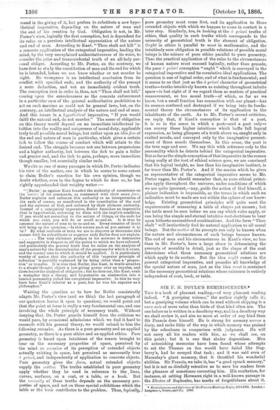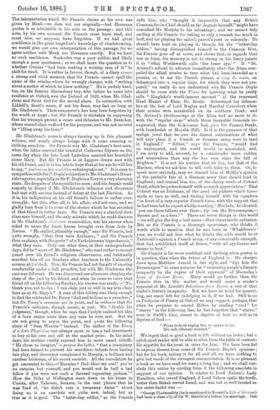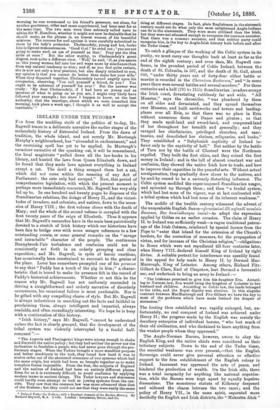SIR F. H. DOYLE'S REMINISCENCES.*
T1115 is a book of pleasant reading,—of very pleasant reading indeed. "A gossiping volume," the author rightly calls it; but a gossiping volume which can be read without skipping is a rara avis of more value than birds of that kind often are. The one before us is written in a desultory way, and in a desultory way we shall review it, and aim no more at order of any kind than Sir Francis does himself. He is strong for memory versus a diary, and reeks little of the way in which memory was praised by the schoolmen in comparison with judgment. He will not carry all his readers with him, as we shall see, on this point ; but it is one that eludes dogmatism. Men of astonishing memories have been found whose attempts to set the Thames on fire would have failed like Dog. berry's, had he essayed that task ; and it was said even of Macaulay's giant memory, that it throttled his wonderful abilities. Sir Francis, we take it, has "a good sprack memory," but it is not so direfully retentive as to save his readers from the pleasure of sometimes correcting him. His exultation, for instance, at setting Hermann .right in a well-known passage in the Electra of Sophocles, has marks of forgetfulness about it.
• Reminiscences and Opinions of SirFrancis Hastinps Dale, 1813-1855. London : Longnians, Green, and 0o. 1886.
The interpretation which Sir Francis claims as his own was given by Monk—we dare not say originally—but Hermann quotes it as admissible in his note on the passage; and this note, by his own account, Sir Francis must have read, and must now, we suppose, have forgotten. If we had great confidence in the great tragedian's knowledge of chariot-racing, we would give our own interpretation of this passage, for we agree neither with Monk nor Hermann exactly. But we have no such confidence. Sophocles was a poor soldier, and likely enough a poor sportsman ; so we shall leave the question as to whether Orestes "had been making a waiting race of it" to shift for itself. It is rather in favour, though, of a diary versus a strong and vivid memory, that Sir Francis cannot spell the name of the scholar whom he wrongly charges with "writing about a matter of which he knew nothing." He is unduly hard, too, on the famous Shrewsbury boy, who before he came into residence at Oxford, won the Ireland of 1829, when Mr. Glad- stone and Scott tied for the second place. In connection with Liddell's, Scott's name, if not his fame, may last as long as Mr. Gladstone's. Their conqueror's has long been forgotten by the world at large ; but Sir Francis is mistaken in supposing that his triumph proved a snare and delusion to Mr. Brancker, whose second-class sufficed for his purpose, and was not secured by "idling away his time."
Mr. Gladstone's name is always turning up in this pleasant volume, and nearly always brings with it some amusing or striking anecdote. Sir Francis was Mr. Gladstone's best-man, when the latter married the beautiful Catherine Glynne on the same day when the late Lord Lyttelton married her beautiful sister Mary. But Sir Francis is at daggers drawn now with his old friend, and it is too late to hope that at his age he will live to say," Amicorum irm amicitice redintogratio est." It is easy to sympathise with Sir F. Doyle's objection to Mr. Gladstone's Home- rule vagaries, especially as Sir F. Doyle is a Tory in a very alarming state. He despairs of the republic too soon ; and his despair could scarcely be deeper if Mr. Gladstone's influence and eloquence had met with success instead of defeat at the last Election. As it is, his indignation at his old friend's failure is rather over- wrought ; but this, after all, is his affair, and not ours, and we gladly turn from it to some of the stories which he has recorded of that friend in better days. Sir Francis was a classical first- class man himself, and the only mistake which he could discover in Mr. Gladstone's vicd-voce examination, was his answer when asked to name the finest horses brought over from Asia by Xerxes. "He replied, plausibly enough," says Sir Francis, but quite wrongly, "that they were Arabians ; " and Sir Francis then explains, with the gusto" of a Yorkshireman hippodamoio," what they were. Only one other time, in their undergraduate days, did he "score off Mr. Gladstone," who used rather to mount guard over his friend's religious observances, and habitually marched him off on Sundays after luncheon to the University sermon at 2 o'clock. Now, Sir Francis had not the gift of snoring comfortably under a dull preacher, but with Mr. Gladstone the case was different. He was discovered one afternoon sleeping the sleep of the just by his friend, and when he came to carry that friend off on the following Sunday, his answer was ready,—" No, thank you, not to-day ; I can sleep just as well in my arm-chair here as at St. Mary's." A man of this kidney was likely enough to find the celebrated Dr. Posey "dull and tedious as a preacher;" but Dr. Pusey's sermons are in print, and in evidence that Sir Francis's criticism, though severe, is just. We "disable his judgment," though, when he says that Carlyle realised his idea of a born orator more than any man he ever met. But we are not going to argue the point, and quote the following story of "Sam Warren" instead. The author of the Diary of a Late Physician was always more or less a bad investment to buy at his own and sell at the market price. In his salad days, his restless vanity exposed him to some smart rebuffs. "He chose to imagine," a propos des bottes, "that a conspiracy had been formed to prevent his matchless talents from having fair play, and thereupon complained to Murphy, a brilliant and careless Irishman, of his secret enemies. All the consolation he got amounted to this,—' Enemies ? God bless my soul ! you've no enemies but yourself, and you would not be half a bad fellow if you were not such a damned vaponring jackass." How- the Duke of Wellington went down on his knees to Cuesta, after Talavera, because, in the cant phrase that he was fond of, "he didn't care a twopenny damn" about doing so, is an anecdote not quite new, indeed, but as true as it is good. The "latter-day soldier," as Sir Francis
calls him, who "thought it impossible that any British Commander-in-Chief should so far degrade himself," might have consulted Mr. Murphy to his advantage ; and we cannot help smiling at Sir Francis for taking so silly a remark too much in huff, and for playing the sailor's parrot's part so solemnly. He should have kept on playing it, though, for the "latter-day soldier," having distinguished himself in the Crimean War, Sir Francis goes off at score, and shows that, as regards that war at least, his memory is not so strong as his fancy paints it to "what Wordsworth calls the inner eye.'" If "St. Arnand's refusal to advance immediately after the Alma com- pelled the allied armies to tarn what had been intended as a pounce, or, to use the French phrase, a coup de main, on Sebastopol into a regular siege, for which they were not pre- pared," we really do not understand why Sir Francis Doyle should be cross with the Times for ignoring what he justly calls " Kinglake's world-famous account " of the renowned Head Master of Eton, Dr. Keate. Sebastopol lay defence- less at the feet of Lord Raglan and Marshal Caurobert when their armies were marshalled on its southern front; and St. Arnaud's shortcomings at the Alma had no more to do with the "regular siege" which those incapable Generals in- augurated, than the Koh-i-noor had, pace Sir Francis Doyle, with Isandoolah or Majuba Hill. Is it to the presence of that malign jewel that we owe his dismal vaticinations of what will take place if a French or German army were to land in England ? " Either," says Sir Francis, "would find us unprepared, and the world would be astonished, and, I am sorry to add, amused, by a catastrophe more sudden and tremendous than any she has seen since the fall of Brighton." It is not his pardon that we beg, but that of the Marines, when we ask him to tell such tales to them. Or, to speak more seriously, may we remind him of Moltke'e opinion of the probable fate of a German army that should land in England ; and remind him, too, of the cheery words of Colonel Head, which he quotes himself with so much appreciation ? That Colonel was an Irishman, of the good old pattern which Lever made us love so well, and finding himself with his squadron "in front of a very superior French force, with the support that be bad been led to expect wholly wanting, Mee lads,' he shouted, you see those fellows over there ; tip 'em the Brummagem,— Spurrs and sa-a-bres !" There are worse things in this world —we will give the dog a bad name—than chauvinistic optimism. But as Sir Francis is a thorough sportsman, who thinks it worth while to mention that he was born in 'Whalebone's' year, we would ask him what he thinks the odds would be at Tattersall's against a French army, of any conceivable strength, that had established itself at Dover, "with all appliances and means to boot."
Sir Francis is far more confident and dashing when poetry is in question, than when the future of England is. He charges down upon Matthew Arnold in fine style, and "tips him the Brummagem" to some purpose for "measuring people's literary incapacity by the degree of their approval" of Macaulay's Lays of Ancient Rome. Many would go further than Sir Francis does in this matter, and would make a reader's approval of Mr. Arnold's Selections from Byron a test of that reader's literary incapacity. But we have no mind for quarrel- ling, nor space left for indulging in it, if we had. Still to an ex-Professor of Poetry at Oxford we may suggest, perhaps, that when he proposes to amend Milton by reading " cool " for " starve " in the following line, he has forgotten that "starve," even in Swift's time, meant to deprive of heat as well as to deprive of food :—
"From beds of raging firo, to starve in ice
His soft ethereal warmth."
We regret that so good a book is left without an index ; but a quick-eyed reader will be able to whet from the table of contents his appetite for the treat in store for him. We have been led to express dissent from some of Sir Francis Doyle's opinions ; but for his book, taking it for all and all, we have nothing to give but words of the strongest commendation. It is as pleasant a book as we have read for many a long day ; and we shall con- clude this notice by quoting from it the following anecdote in support of our opinion. It relates to Lord Nelson's Lady Hamilton, who served England, if Lord Nelson spake the truth, better than Rahab served Israel, and was not so well treated as her sister-harlot was :—
"George Cholmondely (he is mentioned in Boswell's Life of Johnson) had been a close ally of Sir W. Hamilton's before his marriage. One morning he was summoned to his friend's presence, not alone, for another gentleman. older and more experienced, had been sent for at the same time. The two men were then solemnly called upon to advise Sir W. Hamilton, whether it might not now be desirable that he should make, as the phrase is, an honest women of his beautiful mistress. The reasons for and against it were carefully submitted to them by the lady's protector. Cbolmondely, young and hot, broke into inffignant remonstrances. 'Good God !' he cried out ; you are not going to make each an ass of yourself as that ! Pray put the idea aside at once !' But the other worthy, to Cholmondely's great disgust, took quite a different view. 'Well,' he said, if, as you assure us, this young woman fell into her evil ways more by mischance than from any natural tendency to vice ; and if, as you feel quite certain, she is now not only a true penitent, but also deeply attached to you, my opinion is that you cannot do better than make her your wife.' When they departed together, Cholmondely turned angrily upon his companion, observing, Yon call yourself a friend, do you ? You ought to be ashamed of yourself for ever !' Bat the answer was ready : My dear Cholmondely, if I had been as youug and as ignorant of what is going on as you are, I might very likely have followed your example ; but since I happen to know, on the beet authority, that the marriage, about which we were consulted this morning, took place a week ago, I thought it as well to swept the inevitable.'"




































 Previous page
Previous page